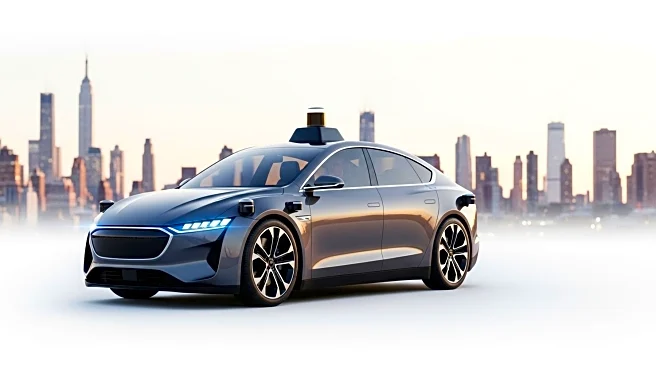What's Happening?
Waymo, an autonomous taxi company owned by Alphabet, has received approval from New York City's transportation department to operate self-driving vehicles in parts of Manhattan and downtown Brooklyn. This decision has sparked opposition from Open Plans, a street safety advocacy group, which argues that the technology has not been adequately tested in densely populated urban environments like New York City. Michael Sutherland, a policy researcher with Open Plans, criticized the pilot program for lacking public input and emphasized the need for more reliable public transit solutions over self-driving cars. Despite Waymo's claims that their vehicles are safer than human-driven cars, the National Highway Traffic Safety Administration recalled over 1,200 Waymo vehicles due to safety incidents involving collisions with chains or gates.
Why It's Important?
The introduction of self-driving taxis in New York City represents a significant shift in urban transportation, potentially impacting public transit systems and traffic patterns. While Waymo asserts that their technology reduces serious-injury crashes, the recall of vehicles due to safety concerns highlights the challenges of integrating autonomous vehicles into complex city environments. The opposition from advocacy groups underscores the need for thorough testing and public consultation to address safety and infrastructure concerns. This development could influence future regulatory decisions and public acceptance of autonomous vehicles in major cities across the U.S.
What's Next?
As Waymo begins testing its self-driving taxis in New York City, stakeholders including city officials, advocacy groups, and the public will closely monitor the program's outcomes. Potential adjustments to regulations or operational guidelines may arise based on the pilot's performance and feedback from the community. The ongoing debate over the role of autonomous vehicles in urban settings is likely to continue, with implications for transportation policy and investment in public transit infrastructure.
Beyond the Headlines
The deployment of self-driving taxis in New York City raises broader questions about the ethical and legal responsibilities of autonomous vehicle operators. Issues such as liability in the event of accidents and the impact on employment in the taxi industry are critical considerations. Additionally, the integration of advanced technology into everyday life prompts discussions on privacy, data security, and the societal implications of reduced human involvement in transportation.









